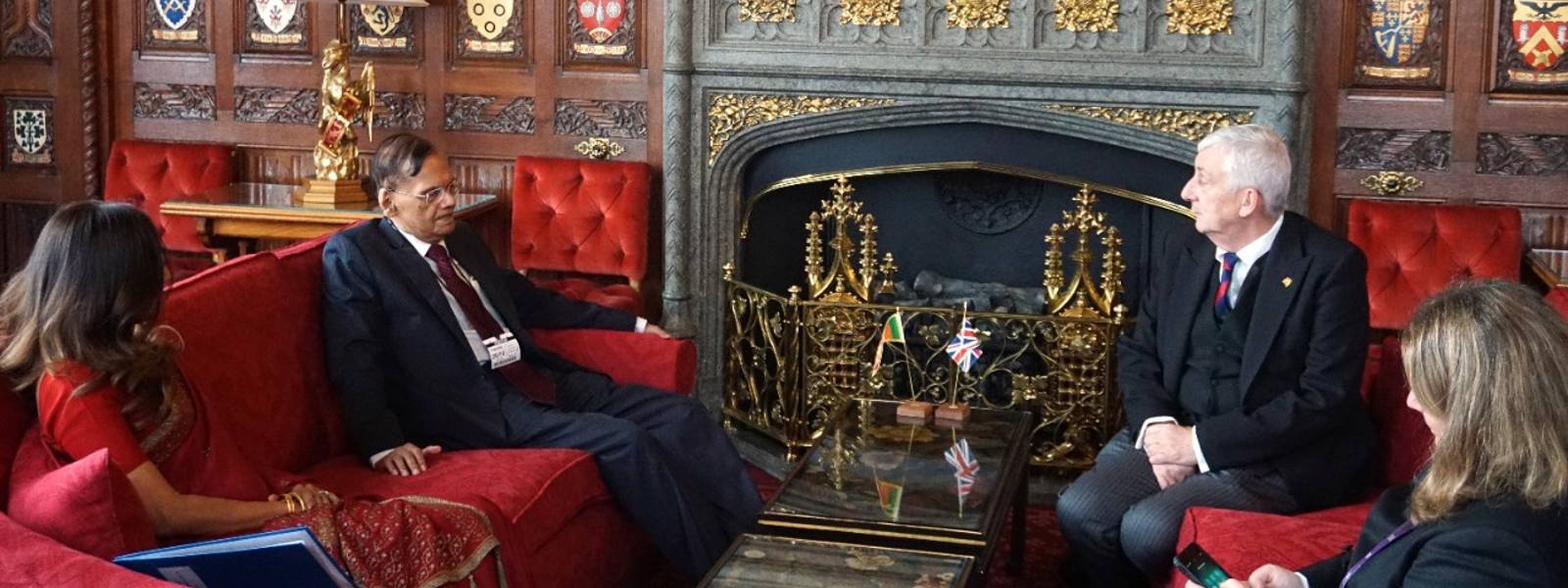.webp)

Sri Lanka considering revival of bicameral legislature: Prof. G.L. Peiris
COLOMBO (News 1st); Sri Lanka is considering the revival of the bicameral legislature, Foreign Minister Prof. G.L. Peiris said while calling on the Speaker of the House of Commons Sir Lindsay Hoyle on 26th October.
Minister Prof. Peiris recalling that the Sri Lankan Parliament came into being almost as an exact replica of the Westminster Parliament, stated that Sri Lanka is keen on strengthening of the bonds between the two legislatures.
He added that Sri Lanka is considering reforms to its legislative institutions and there is a great deal of discussion on reviving the bicameral legislature that existed prior to 1972.
The Foreign Minister also stated that about one-third of the members of the Sri Lankan Parliament are dynamic and energetic MPs below the age of 35.
Furthermore, Minister Prof. Peiris emphasized the need for the strengthening of the committees and more responsibilities being assigned to them. Referring to cooperation in the context of the Commonwealth, he stated that the Commonwealth celebrates diversity and does useful work. Minister Prof. Peiris extended an invitation to Sir Lindsay Hoyle to visit Sri Lanka at a mutually convenient time as well.
Sir Lindsay agreed that strengthening and empowering of the committees of the Parliament paves the way for proper scrutiny of the work of the Government.
As regards the second chamber in a legislature, he opined that the supremacy of the chamber of the elected representatives is important, and the second chamber should not be superfluous.
Moreover, Sir Lindsay agreed that the Commonwealth is a family and is about helping each other, and promised to visit Sri Lanka as soon as possible.
What is the bicameral legislature?
According to the Parliament of the United Kingdom, the business of Parliament takes place in two Houses: the House of Commons and the House of Lords. Their work is similar: making laws (legislation), checking the work of the Government (scrutiny), and debating current issues.
However, the House of Commons is also responsible for granting money to the Government through approving Bills that raise taxes. Generally, the decisions made in one House have to be approved by the other.
In this way the two-chamber system acts as a check and balance for both Houses.
The Commons at the UK Parliament is publicly elected as the party with the largest number of members in the Commons forms the Government.
Members of the Commons (MPs) debate significant political issues and proposals for new laws. It is one of the key places where Government ministers, like the Prime Minister and the Chancellor, and the principal figures of the main political parties, work.
The Commons alone is responsible for making decisions on financial Bills, such as proposed new taxes. The Lords can consider these Bills but cannot block or amend them.
Meanwhile, the House of Lords functions as the second chamber of the UK Parliament. It is independent from, and complements the work of, the elected House of Commons. The Lords shares the task of making and shaping laws and checking and challenging the work of the Government.
Other Articles
Featured News





.png )
-819924_550x300.jpg)
-819903_550x300.jpg)


-819885_550x300.jpg)





-819380_550x300.jpg)


-812087_550x300.jpg)
-810262_550x300.jpg)
















.gif)